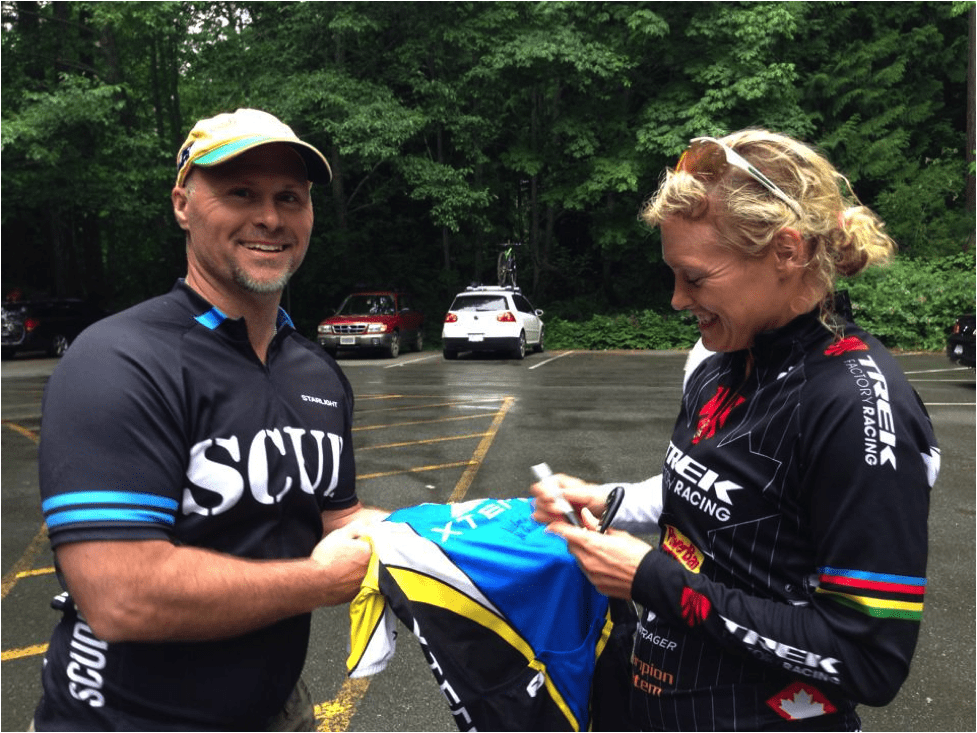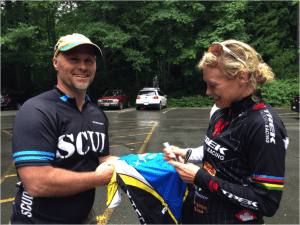Do We Need Pro Athletes?

 I was very unhappy to hear that Lifetime Fitness has cut the prize purse for their series of Olympic distance events in 2015. Of course I am biased in my opinion as to whether pro athletes are valuable or not, since that is my role in the sport at the moment, but I find this news extremely disturbing. I think it’s important that everyone in triathlon see that pros are important to the sport, but I also think pros have an obligation to the field of athletes (pro and amateur), to the race director, to the media and to their sponsors to inspire, motivate, connect with and mobilize participation in the sport. If they do not fulfill those obligations they will quickly discover that they’re not valuable.
I was very unhappy to hear that Lifetime Fitness has cut the prize purse for their series of Olympic distance events in 2015. Of course I am biased in my opinion as to whether pro athletes are valuable or not, since that is my role in the sport at the moment, but I find this news extremely disturbing. I think it’s important that everyone in triathlon see that pros are important to the sport, but I also think pros have an obligation to the field of athletes (pro and amateur), to the race director, to the media and to their sponsors to inspire, motivate, connect with and mobilize participation in the sport. If they do not fulfill those obligations they will quickly discover that they’re not valuable.
In order for the pro event to have an influence on the entire race, pro athletes need to be accessible to age- groupers. Having the opportunity to race the exact same race course at essentially the same time as pros can allow for a great connection with other athletes. This connection is made in a variety of ways. One is through social media, as social media is an inexpensive and wide reaching medium to keep in touch with race fans. I believe every pro needs to actively manage their online persona. In addition, pros need to make themselves available at races. This opportunity should be as important to a pro as winning the race. Race directors and sponsors should play a role in helping to make this happen. Race reports are important (especially since the media can only report on the top few pro racers) for relaying the story of what happened on the day and it’s crucial for developing pros to write professional, sportsmanlike, honest recaps of how a race unfolded. This can be particularly useful for readers and fans when pros share some of their preparation for an event, allowing interested minds to get the whole story.
The media wants an exciting story to showcase and often this starts with what happened in the race. I love the fact the pro women’s event is getting increasingly competitive, but I especially love how respectful the top athletes are among themselves. This is the essence of being a good role model in the media. I believe that is a big part of the pro athlete responsibility: not only should a pro’s own unique personality come through in their public personal, but when pros comment on and support their competition, they build depth in the sport. No one can win if there isn’t a “loser” so being gracious winners and losers makes the sport incredibly human. I love the sport of Ironman for having this culture and I am hoping that all the upcoming new pros are watching closely. People like to root for the humble underdog with loads of talent. New pros should absolutely be positioning themselves for that role.
Removing the Olympic distance prize purses in North America is essentially saying to professionals: “Okay we don’t care if you race Olympic distance- unless you have an ITU career.” Is that the case? Now nobody cares who the strongest over that distance is? Does this mean that in the US if you race an Olympic distance event you might as well be a beginner because nobody actually cares how fast you can go over that distance without drafting? To my mind, non-drafting Olympic distance races allowed more opportunity for ITU athletes to race with non-drafting athletes and thus linked the two disciplines to one another. Given the points chase that is required to qualify for Kona, non-drafting pros have a full schedule of racing in WTC events just to qualify, so I think this reduced the professional field size. Had some of those events counted towards qualification, I think the fields would have been more interesting and thus had the effective draw that a race director was looking for. In my opinion, the diminishing opportunity to race this distance or these formats will be detrimental to the sport over time. Good pros make a difference.
How often do you visit a pro athlete blog to see what they do in training? How much advice are you taking from online magazines discussing the training of the best 1 per cent in the sport? Forums are always buzzing with stories about pros in training and rumours about their secrets. Pro athletes are tasked with setting the bar in the sport and inspiring a field of athletes. The sport of triathlon is like an ecosystem comprised of age-group participants, race directors, governing bodies, race owners, sponsors and professional athletes. I would suggest that the reason many age-groupers want to go to Kona is due to the inspiration they derived from a past professional performance they saw or read about.
I think some people think pro athletes bringing the subject of prize money up for debate have the mistaken notion that pro triathletes are rich, famous and overpaid. This could not be further from the truth. The issue of money in the sport is a world away from NHL players going on strike because their percentage of profits from the sport are not enough. I accept that some sponsors feel there is a sense of entitlement from some new pros coming into the sport.
Pro athletes need to recognize that their true value is in their ability to connect. Whether that connection is due to outstanding results and ability (admiration) or through direction communication (speaking, social media, ambassadorship) your value as a pro is directly proportional to your ability to connect. The most valuable pros in the sport have both facets of connection in play. Likely the most powerful professional athlete from a sponsor’s perspective in the history of triathlon is Chrissie Wellington. Not only was she an absolutely phenomenal athlete, she had outstanding communication skills which she used to leverage her position while she held the spotlight in the sport. She is a role model not just to age-groupers but to male and female pros as well.
The truth is there needs to be enough money in the sport to support a deep pro field and it would be expected that to be supported you should be outstanding at your job. New pros shouldn’t simply expect that the dollar bills will not come just because you have a shiny new pro card. However, to help the new pros find footing in the sport, balanced media coverage should promote a large variety of competitors in the pro field. Giving more professional athletes the opportunity to survive and thrive will build depth in the field. Ironman pros are not funded by national sport organizations like elite triathletes in ITU, so non-drafting racing needs support through prize money and sponsorship opportunity.
Having a dream and making it a reality is what motivates us all to work hard to prepare for these events. Pro athletes are challenged with having the ultimate dream and making it reality through meticulous preparation. If they are in the spotlight, they have the responsibility to share the journey with others with a similar dream. Some pros may not have the talent or physical ability to actually reach the top level of the sport but their pursuit can still a compelling story. This human connection, between the best and the aspiring, is what drives the sport forward and increases participation. I think everyone, sponsors, race directors, and athletes all need to foster this relationship to make it effective as this inspiration and connection is our future as a sport.
